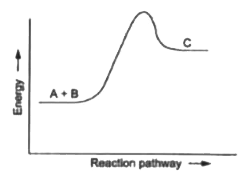For the system 3A+2B⇔C, the expression for equilibrium constant K is
A
[3A]×[2B][C]
B
[A]3×[B][C]
C
C[A]3×[B]2
D
C[3A]×[2B]
Text Solution
The correct Answer is:A, B, C
|
Updated on:21/07/2023
Similar Questions
Knowledge Check
- Question 1 - Select One
For the system 3A+2B⇔ C, the expression for equilibrium constant is
A[3A][2B]CB[C][3A][2B]C[A]3[B]2[C]D[C][A]3[B]2 - Question 2 - Select One
For the system 3A+2B⇔ C, the expression for equilibrium constant is
A[3A][2B]CB[C][3A][2B]C[A]2[B]2[C]D[C][3A]3[2B]2 - Question 3 - Select One
4 moles of A are mixed with 4 moles of B, when 2 moles of C and D are formed at equilibrium according to the reaction,
A+B⇔C+D
the value of equilibrium constant isA4B1C1/2D1/4
1.1 mol of A is mixed with 2.2 mol of B and the mixture is kept in one litre flask till the equilibrium is reached. At equilibrium, 0.2 mol of C is formed. If the equilibrium reaction is
A+2B⇔2C+D
the value of equilibrium constant isView SolutionThe energy profile of the reaction: is shown as A+B⇔C is shown as,

The equilibrium constant for the said equilibriumView SolutionFor the reaction
H2(g)+I2(g)⇔2HI(g)
The equilibrium constant Kp changes withView SolutionFor the reaction, H2(g)+I2(g)⇔2HIg, the equilibrium constant Kp changes with
View SolutionFor the equilibrium A+B⇔C+D, equilibrium constant may be equal to
View Solution

